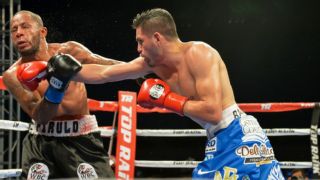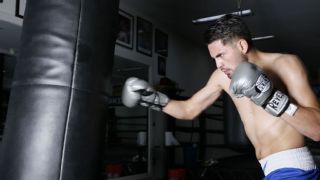|
Editor's note: This story was originally published on Nov. 9 2017. LOS ANGELES -- In the summer of 2006, Jose Ramirez got his first job. He was 14, and thought asking his father for movie money would make him less of a man. The bus picked them up -- several dozen or so, from teenagers to men and women in their 60s -- at a gas station in his hometown of Avenal, California. Jose wore the uniform: long pants, long sleeves, a Dodgers cap for the sun, a bandana for the dust. It was shortly after 5 a.m. when he picked his first bell pepper, but still dark when the crew took its first break. No problem, he thought. "I was in great shape," recalls Ramirez, already an amateur of some renown in the San Joaquin Valley, merciless in the gym. The task seemed so much less daunting than his immigrant parents had warned.  Then the sun came up, blinding. And with it, the heat. His back began to ache. Bell peppers grow on a vine, a few feet off the ground. By noon, Ramirez had begun to understand the dichotomous nature -- not just of himself, but the days to come. Part of him asked for permission to quit. His other self remained too proud -- even as the tractor crept up behind him, closing the distance with its long metal arm, the harvesting machine. That first half of the day, you're standing, leaning over the peppers. By noon, you're shuffling along on your knees. That was the life, and just about everyone he knew lived it: an existence that inevitably forces you to submit. On Saturday night, Jose Ramirez will fight an hour north of Avenal, in Fresno, the seat of a county with California's highest poverty rate, according to the 2010 federal census. Ramirez, now 25, is undefeated in 20 fights (15 KOs). A member of America's 2012 Olympic team, he has great amateur pedigree and a fine hook to the body, but he's not yet a champion nor a household name. Nevertheless, a sellout crowd -- in excess of 14,000 -- is expected for his 140-pound title eliminator with Mike Reed, 23-0, ranked 10th by the WBO. It would be Ramirez' third consecutive sellout at Save Mart Arena, making him a complete anomaly among non-pay-per-view fighters. He's not a provocateur. He's not insta-famous and doesn't drive a Lamborghini. But he does stand for something. "Every time I achieve," he says, "the pride falls on all of us." These Save Mart crowds are his people, and they've kept boxing alive and vital in America. Apparently, they never got the notice -- issued erroneously across decades now -- that the sport was dead. "Where I'm from," Ramirez says, "you couldn't find a family that grew up without watching one Chavez fight. Or one De La Hoya fight. Or Ricardo (El Finito) Lopez, Fernando Vargas, (Marco Antonio) Barrera, (Erik) Morales, (Juan Manuel) Marquez, Salvador Sanchez -- guys my grandpa would tell me about." If they were Mexican families, they were also becoming something else: Americans. It's been this way for more than a century, going back to the Irish, the Italians, the Jews. Now as ever, boxing remains America's undisputed immigrant sport.  Last year, Oxnard, California-born Mikey Garcia wondered how long President Donald Trump would last in the strawberry fields where his parents worked. More recently, Ray Beltran's lightweight battles have been framed as a quest for his green card, a document that would keep him in this country with his wife and kids. But no one represents quite like Jose Carlos Ramirez, and never more than he does now, in this moment. It began several years ago when he allied himself with the California Latino Water Coalition. The great drought pitted the interests of farms and farmworkers against environmentalists who sought limit the water supply to help an endangered species of fish, the delta smelt. The "Fight for Water," as Ramirez's cards were billed, kept selling out, starting with 3,000-seat community college gyms. As the foil in a dramatic construct, however, the delta smelt has limitations. It took a presidential candidate who spoke of building walls to make Ramirez truly relevant. A year and a half ago, promoter Bob Arum thought to rebrand the Pacquiao-Bradley 3 prelims -- featuring four prominent fighters of Mexican descent -- as the "No Trump Undercard." "I was proud to be part of 'No Trump,'" Ramirez says. "He had insulted so many Mexican families, so many immigrants." Whatever your take on the President, he's been great for Ramirez's career. Circumstances conspired to provide him what most fighters lack -- an identity. He's not a club fighter with patches for a bail bondsman and a donut shop on his trunks. Ramirez represents Dodge RAM trucks and Nike, craft tequila and the NISEI Farmers League. He stands for a star-spangled vision -- one both Trump and Arum endorse -- the harmony of politics and commerce. In the short term, his business is Mike Reed, a contemporary from their amateur days. A sharp southpaw, though not a knockout artist, Reed has been calling out Ramirez for a couple of years now. "He's a little jealous, feels he hasn't gotten the attention I have," says Ramirez, who trains with Freddie Roach at the Wild Card Boxing Club gym in Hollywood. "He says I'm an incomplete fighter. But I went to the Olympics. He didn't." A win on Saturday should give Ramirez a title shot, a chance to succeed the great Terence Crawford at 140 pounds. He's motivated for sure: money, glory, power and that which every fighter has, somewhere, a lust for violence. But there's something else with Ramirez, and it's always there, an idea tethered to that first week picking bell peppers. She was in her fifties and overweight -- flannel shirt, green baseball cap, pink bandana. It must've been 110 degrees, and she was already on her knees when Ramirez heard her moan. She'd begun to sway, then braced her arms against the ground to keep from falling. Somebody yelled at the tractor driver and, finally, the harvesting machine stopped, just a few feet from where she lay. "The driver," recalls Ramirez, "that guy had no pity." Jose and his friend, Robert Lopez, pulled the woman into the shade. She was given some water and sent home. That night, the 14-year-old fighter promised his parents he'd finish out the week, but all things considered, it might be best just to concentrate on boxing. Come 4:30 the next morning, he sees the woman at the gas station in Avenal. He never knew her name. But can't forget what she taught him. And prays she'll be there Saturday night.
|
